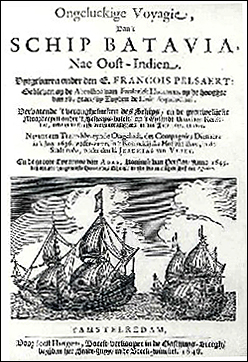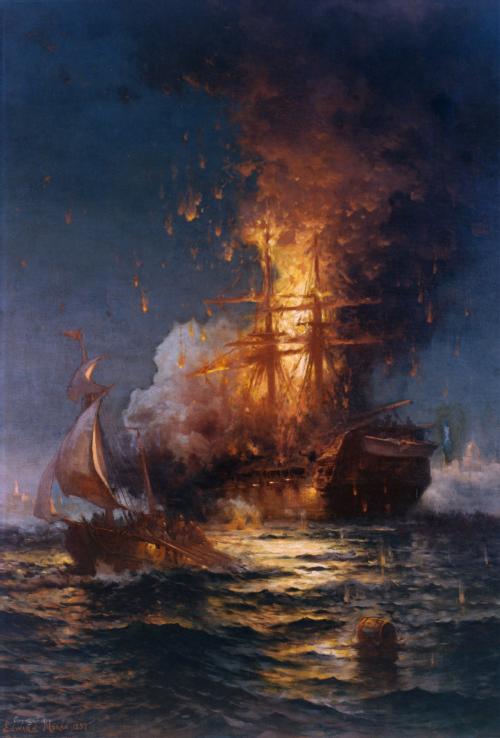Week 9. Voyages Gone Wrong: Shipwreck and Captivity
Sea travel posed a multitude of risks to crews and passengers, shipwreck and piracy foremost among them. Besides representing evident dangers to individual lives and liberty, the levelling effects of shipwreck and captivity also challenged the social order in profound ways. As such, voyages gone wrong and their narrative recounting offer rich insights into prevailing hierarchies and divisions of class, gender, religion, and ethnicity, and how societal norms and power structures were variously enforced, contested, transgressed, and enacted in moments of crisis. Of particular interest is the role of violence and the ways its discursive rendering in travel accounts shines light on questions regarding authority, identity, individual agency and collective action.
Core Readings (select two)
Peter Linebaugh and Markus Rediker, The Many Headed Hydra: Sailors, Slaves, Commoners, and the Hidden History of the Revolutionary Atlantic (Boston: Beacon Press, 2000), Ch. 1: 'The Wreck of the Sea-Venture', pp. 8-35. Link.
Judith E. Tucker, 'She Would Rather Perish: Piracy and Gendered Violence in the Mediterranean', Journal of Middle East Women's Studies 10.3 (2014), pp. 8-39. Link.
Richard Guy, 'Calamitous Voyages: The Social Space of Shipwreck and Mutiny Narratives in the Dutch East India Company', Itinerario 39.1 (2015), pp. 117-140. Link.
Primary sources
Read one of the shipwreck and/or captivity accounts included in the following (see Further Reading): Adams, The Narrative; Baepler, White Slaves, African Masters; Bekkaoui, White Women Captives; Boxer, Tragic History; Thompson, Romantic Era Shipwreck Narratives (free download); Vitkus, Piracy, Slavery, and Redemption.
Seminar Questions
- How do shipwreck narratives operate to subvert or reinforce the prevailing social order?
- Does a history from below change your perspective on colonial travel? How?
- How were experiences of Mediterranean corsairing and captivity gendered and in what ways did gendered violence intersect with categories of religion, nation, and race?
- Apply Tucker's approach to the primary source you’ve read: how are masculinity and femininity coded in its recounting of violence and resistance?
- Apply the perspectives of Linebaugh and Rediker and/or Guy to the primary source you've read: what does it reveal regarding the place of power and resistance in histories of travel?
Further Reading
Adams, Charles Hansford (ed.), The Narrative of Robert Adams, A Barbary Captive: A Critical Edition (Cambridge: Cambridge University Press, 2005). Link.
Baepler, Paul, White Slaves, African Masters: an Anthology of American Barbary Captivity Narratives (Chicago: University of Chicago Press, 1999). Library hard copies.
Bekkaoui, Khalid (ed.), White Women Captives in North Africa: Narratives of Enslavement, 1735-1830 (Houndmills: Palgrave MacMillan, 2010). Link.
Boxer, C.R. (ed.), The Tragic History of the Sea, 1589-1622: Narratives of the Shipwrecks of the Portuguese East Indiamen São Thomé (1589), Santo Alberto (1593), São João Baptista (1622) and the Journeys of the Survivors in South East Africa (Cambridge: The Hakluyt Society, 1959). Link.
Colley, Linda, Captives: Britain, Empire and the World, 1600-1850 (London: Jonathan Cape, 2002).
Colley, Linda, The Ordeal of Elizabeth Marsh: a Woman in World History (London: Harper Perennial, 2008).
Davis, Robert C., Christian Slaves, Muslim Masters: White Slavery in the Mediterranean, the Barbary Coast, and Italy, 1500-1800 (Basingstoke: Palgrave Macmillan, 2003). Library.
Grieve, Patricia E., 'Conversion in Early Modern Western Mediterranean Accounts of Captivity: Identity, Audience, and Narrative Conventions', Journal of Arabic Literature 47.1-2 (2016), pp. 91-110. Link.
Haberman, Ina, 'Death by Water: The Theory and Practice of Shipwrecking', in: Bernhard Klein (ed.), Fictions of the Sea: Perspectives on the Ocean in British Literature and Culture (London and New York: Routledge, 2002), pp. 104-120. Link.
Hershenzon, Daniel, 'The Political Economy of Ransom in the Early Modern Mediterranean', Past & Present 231.1 (2016), pp. 61-95. Link.
Hershenzon, Daniel, The Captive Sea: Slavery, Communication, and Commerce in Early Modern Spain and the Mediterranean (Philadelphia: University of Pennsylvania Press, 2018). Link.
Igler, David, 'Captive-Taking and Conventions of Encounters on the Northwest Coast, 1789-1810', Southern California Quarterly 91.1 (2009), pp. 3-25. Link.
Klarer, Mario (ed.), Piracy and Captivity in the Mediterranean: 1550-1810 (London: Routledge, 2018). Link.
Lincoln, Margarette, 'Mutinous Behavior on Voyages to the South Seas and Its Impact on Eighteenth-Century Civil Society', Eighteenth-Century Life 31.1 (2007), pp. 62-80. Link.
Lincoln, Margarette, 'Shipwreck Narratives of the Eighteenth and Early Nineteenth Century: Indicators of Culture and Identity', British Journal for Eighteenth Century Studies 20.2 (1997), pp. 155-172. Link.
Lydon, Jane, 'Visions of Disaster in the Unlucky Voyage of the Ship Batavia, 1647', Itinerario 42.3 (2018), pp. 351-374. Link.
Matar, Nabil, British Captives from the Mediterranean to the Atlantic, 1563-1760 (Leiden and Boston: Brill, 2014). Link.
Matar, Nabil, Europe Through Arab Eyes, 1578–1727 (New York: Columbia University Press, 2009), Ch. I: 'Popular Sources: Accounts of Muslim Captivity in Christendom', pp. 29-71. Link.
Mentz, Steve, '‘We Split!’ Shipwreck in Early Modern European History and Culture', in: Claire Jowitt, Craig Lambert, and Steve Mentz (eds.), The Routledge Companion to Marine and Maritime Worlds 1400-1800 (London: Routledge, 2020), pp. 580-597. Link.
Morrison, James V., Shipwrecked: Disaster and Transformation in Homer, Shakespeare, Defoe, and the Modern World (Ann Arbor: University of Michigan Press, 2014). Link.
Shannon, Timothy J., Atlantic Lives: A Comparative Approach to Early America (2nd ed. New York: Routledge, 2019), Ch. 3: Captivities [includes primary source excerpts] Link.
Staden, Hans, Neil L. Whitehead, Michael Harbsmeier, and Jo Ellen Fair (eds.), Hans Staden's True History: An Account of Cannibal Captivity in Brazil (Durham and London: Duke University Press, 2008). Link.
Thompson, Carl (ed.), Romantic Era Shipwreck Narratives (Nottingham: Trent Editions, 2007). Free e-book download.
Thompson, Carl (ed.), Shipwreck in Art and Literature: Images and Interpretations from Antiquity to the Present Day (New York and London: Routledge, 2013).
Titlestad, Michael,'‘Dead to the World, and Almost to Ourselves’: William Mackay's Narrative of the Shipwreck of the Juno (1798)', South African Historical Journal 61.4 (2009), pp. 788-801. Link.
Vitkus, Daniel (ed.), Piracy, Slavery, and Redemption: Barbary Captivity Narratives from Early Modern England (New York: Columbia University Press, 2001). Library hard copies.
Captivity Narratives. Oxford Bibliographies. By Kendall Johnson.
Captivity in North America. Oxford Bibliographies. By Evan Haefeli.


.
